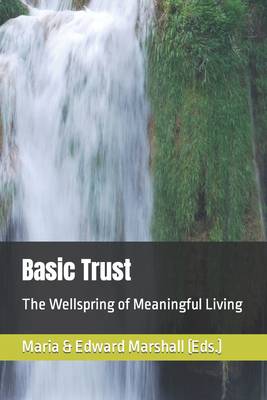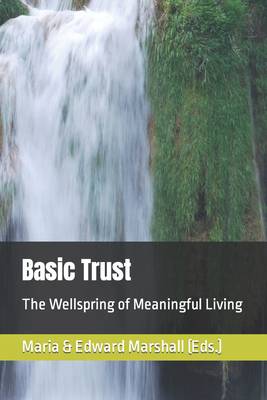
- Afhalen na 1 uur in een winkel met voorraad
- Gratis thuislevering in België vanaf € 30
- Ruim aanbod met 7 miljoen producten
- Afhalen na 1 uur in een winkel met voorraad
- Gratis thuislevering in België vanaf € 30
- Ruim aanbod met 7 miljoen producten
Zoeken
€ 46,45
+ 92 punten
Omschrijving
The present book offers a collection of writings by professionals and clinicians familiar with the work of Viktor E. Frankl, an Austrian psychiatrist, and the founder of Logotherapy and Existential Analysis (LTEA), a meaning-centered approach to psychotherapy. This mosaic illustrates the nature, aspects, dimension, and relevance of basic trust as the source of meaningful living. "Interconnectedness," by Prof. Dr. Elisabeth Lukas, invites the reader to consider lived experience in the context of a larger whole of humanity's search for meaning. "Never Again!" a speech by Rabbi Idan Scher, affirms that the universal call to value the dignity of every person and each life. "From Psychotherapy to Logotherapy," by Prof. Dr. Maria Marshall, reviews the evolution of LTEA and its clinical implications. "Monanthropism and the Peace Movement" by Prof. Dr. Thiago Avellar de Aquino, Josilene Silva Cruz, and Dr. Eliseudo Salvino Gomes, advocates to complement freedom with responsibility, and to consider cultivating a spirit of one humanity, forgiveness, tolerance, kindness, and gratitude as fundamental virtues on the path to peace. Two articles by Prof. Dr. Maria Marshall "The Road Less Travelled", and "Choosing the Path to Meaning," illustrate how certain mindsets can lead away from meaning to despair. A reflection by Rev. Prof. Dr. Timothy Lent echoes the words of St. Augustine, according to which "...Our hearts are restless," until they rest in the source of faith. The poem, "The Fall and Then..." by Dr. Guillermo Pareja Herrera, suggests that there are many ways in which human beings experience brokenness and vulnerability, yet though their very nature, they are challenged to get up and stand straight. According to Dr. Teria Shantall, every day is a new day during which we can live with "Anticipatory Hope," instead of anticipatory fear. Two articles by Prof. Dr. Maria Marshall "'Existential Angst' and 'Existential Threat'" and "Healing through Meaning in Situations of Conflict," illustrate the possibility of using logotherapeutic principles to face anxiety with courage to facilitate healing. "Building Oases of Meaning," by the same author, explores the possibility of cultivating value-discerning communities. "Healing the Wounds," a brief reflection by Dr. Teria Shantall, reaffirms that cultivating Basic Trust requires to affirm the unscathed potentials of the human spirit. The search for meaning in suffering, the themes of reconciliation, and redemption, are evident in two book reviews: "Indian Horse," by Peter Marshall, and "Oscar and the Lady in Pink," by Michael Marshall. The metaphor of the "Star Thrower" raises the possibility of becoming empathetic, exactly because of the awareness of the reality of suffering. "A Message of Hope," by Dr. Edith Eva Eger reinforces this point. Dr. Eger is a Holocaust survivor, a clinical psychologist, and trauma specialist. The following article, "Management of Moral Injury in Health Care Workers," by Prof. Dr. Edward Marshall, and Prof. Dr. Maria Marshall addresses the use of meaning-centered principles in facilitating healing after suffering because of values transgressions. "How can we Help Different People in the Current Crisis of War," by Prof. Dr. Svetlana Shtukareva, contains meaning-centered insights that speak to the questions and issues of the hour. Likewise, the article, "Supporting Refugees and Persons who have been Displaced," by Prof. Dr. Maria Marshall. "From Fear to Trust," by the same author, contains up- to-date research findings concerning the neuro-psychological, and existential aspects of fear and trust. Stephan Baier's interview with Prof. Dr. Elisabeth Lukas, entitled "Trust," discusses the nature and function of Basic Trust. The book ends with the "Prayer of Habakkuk," an example of reaching to the dimension of the Transcendent in spirit-our home.
Specificaties
Betrokkenen
- Auteur(s):
- Uitgeverij:
Inhoud
- Aantal bladzijden:
- 292
- Taal:
- Engels
Eigenschappen
- Productcode (EAN):
- 9798835273348
- Verschijningsdatum:
- 9/06/2022
- Uitvoering:
- Paperback
- Formaat:
- Trade paperback (VS)
- Afmetingen:
- 152 mm x 229 mm
- Gewicht:
- 394 g

Alleen bij Standaard Boekhandel
+ 92 punten op je klantenkaart van Standaard Boekhandel
Beoordelingen
We publiceren alleen reviews die voldoen aan de voorwaarden voor reviews. Bekijk onze voorwaarden voor reviews.











